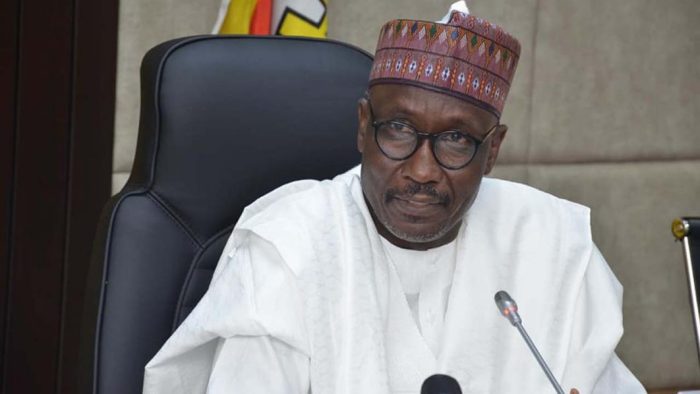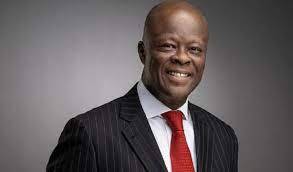
Reports in the media today indicating that President Goodluck Jonathan has vowed to nail corrupt governors appear to be causing some disquiet within the presidential villa.Vice President Namadi Sambo who actually represented the president at the launch of the book yesterday by Dr Ngozi Okonjo Iweala,the finance minister has issued statement saying nothing of that sort was said by the president.
And in what appears a bid to further convince everyone that Jonathan in deed didn’t say so, the full text of the president’s address at the book has been subsequently released by Dr Reuben Abati, the president’s spokesman.
A statement this afternoon by Umar Sani,the vice president’s spokesman said,”The President who was represented by the Vice President at the occasion of the book launch titled “Reforming the Unreformable” by the Coordinating Minister of the economy and Minister of Finance Ngozi Okonjo Iweala, which held at the Transcorp Hilton Hotel, never made any such statement referring to any governor”
The statement by Sani said ,“Our attention was drawn to a publication in some national newspapers where President Goodluck Jonathan was reported to have stated that they will nail corrupt governors. The President who was represented by the Vice President at the occasion of the book launch titled “Reforming the Unreformable” by the Coordinating Minister of the economy and Minister of Finance Ngozi Okonjo Iweala, which held at the Transcorp Hilton Hotel, never made any such statement referring to any governor. Rather the statement in question reads in part “on the governance front, we are going after those who commit economic crimes and corrupt practices with impunity”
Continuing , he said “In the light of the foregoing therefore, we wish to draw the attention of all those mediums who reported Mr. President’s statement inappropriately to address it properly and reflect the correct statement. This will set the records straight by not misleading members of the public and casting aspersions on governors who are our partners in progress in our transformation agenda.
Whether this will indeed convince the governors remains to be see.Newsdiaryonline.co in deed learnt that the suspicion that Jonathan may indeed be planning to deal with some of the governors is one of the reasons that will affect the kind of political alliance and intrigues towards 2015.
Read the full text of Jonathan’s address at Okonjo-Iweala’s book launch as released today:
REMARKS BY HIS EXCELLENCY, PRESIDENT GOODLUCKEBELE JONATHAN, GCFR, AT THE LAUNCH OF THE BOOK: “REFORMING THE UNREFORMABLE” WRITTEN BY DR. NGOZIOKONJO-IWEALA, MINISTER OF FINANCE AND COORDINATING MINISTER FOR THE ECONOMY. ABUJA, 30TH OCTOBER 2012.
PROTOCOLS
I am glad to be here today to launch the book entitled: “Reforming The Unreformable: Lessons from Nigeria,” written by one of our country’s shinning lights, Dr. NgoziOkonjo-Iweala, the Minister of Finance and Coordinating Minister for the Economy.
I would like to commence my remarks by congratulating Dr. Okonjo-Iweala for finding the time, in spite of her busy schedule, to document her experience and in the process, provide insight to the workings of the Economic Management Team.
On a personal note, I see this publication as an attestation of patriotism on the part of the author. As an Administration, we shall always support such enterprise, for the purpose of setting the records straight.
The central message of this important book is hope – hope that Nigeria can reform, and grow to become one of the world’s most dynamic economies. In the past, there was a lot of cynicism about Nigeria. Many people claimed that the political and economic institutions of this country could never be reformed.
I commend this book for documenting some of the important reforms, which have occurred in Nigeria since our recent democratic transition. Indeed, the CME argues convincingly, in this book, that Nigeria is gradually reforming. She shares her own personal experiences in playing a pivotal role in some of the recent economic reforms.
As President, one of my major objectives is to build strong institutions and embark on vital and needed reforms that will consolidate our democratic enterprise and guarantee sustainable development.
Sustained reforms flourish better in an atmosphere of democracy and freedom – and we are continuing to work to ensure that sound democratic principles are upheld in the country. Ever since, the 2011 presidential elections adjudged to be one of the freest and fairest in our nation’s history, we have successfully held several state and local government elections, which have been equally applauded.
Just last week, we also conducted a very successful gubernatorial election in Ondo State, where Governor OlusegunMimiko, who is not from the ruling party at the National level, was declared winner and returned elected. This is a new dawn in our initiative on electoral reform.
In all successful democracies, the leadership pauses periodically to take stock of changes, which have occurred: what new institutions have been built, what successes have been achieved, and what challenges remain? In the case of Nigeria, this book fills the void created by the dearth of literature and good systematic account of the reforms and institutional changes, which have occurred in the country, since our return to democratic rule in 1999.
Too often Africa’s history, economic challenges, and progress have been written and narrated by outsiders. Now, we have a book, written by one of our very own scholars, who is candid about our problems, and also commends us when our reforms are successful. Nigerian and African leaders need to invest more in writing about their experiences, and I commend Dr. Okonjo-Iweala for investing time and resources into writing this book.
I am aware that many people may have read about Nigeria’s debt relief from the Paris Club, about the privatization program, or about the establishment of the excess crude account from newspapers. In this book, you will find a concise, well-organized discussion of all these policy measures without the big, technical, “grammar” and jargon. In each case, you will learn more about what the problem was; what reforms were introduced to address the problem and finally what are the challenges that still remain.
As the author points out in her book, the challenges of creating jobs, fighting corruption and completing various structural reforms are important task needing urgent attention. I am glad to reiterate that these concerns are already being tackled in the current Transformation Agenda of this Administration.
Let me assure you that my administration is not only committed to reform, we are indeed building on some of the reform measures initiated by my predecessors. Specifically, we are consolidating the macroeconomic reforms introduced in recent years. We are going further to focus on the various sectoral reforms, which will create jobs in our economy.
On the governance front, we are going after those who commit various economic crimes and corrupt practices with impunity. As you may be aware, Government is taking every legal measure to ensure that those who defraud the government in the petroleum subsidy scheme are made to pay back the stolen funds, and also are severely punished.
Let me also use this opportunity to restate this Administration’s commitment to diversifying our economy, with particular emphasis on agro-business and value addition in the exploitation of other resources, all aimed at generating employment and creating wealth.
Distinguished Guests, Ladies and Gentlemen, a book as comprehensive as this will not be without controversy, and will definitely touch some raw nerves. However, I know the author well, and can attest that she is someone with a great deal of objectivity, and also one who means well for Nigeria. I beleive that this book is motivated by an honest desire to provide lessons, which can support our nation’s long-term economic future.
Although this book focuses mostly on the reforms implemented at the Federal Level, I believe it also has many lessons on how reform measures can be implemented at the sub-national levels. I therefore urge State Governors and Local Government Chairmen to avail themselves copies of the book, which I am confident would stimulate robust discussions.
I also recommend this book to all of you here who are interested in our country’s ongoing economic reforms. The practical advice and economic policies that the minister discusses would provide encouragement to policy-makers not only in Nigeria, but also in many other African countries. Reforms are possible, we can build sound and transparent democratic institutions, and we can also fix our economies to transform the lives of our people.
Once again, I congratulate Dr. NgoziOkonjo-Iweala for this work and for contributing richly to the advancement of governance scholarship. It is now my pleasure to present to you the book: “Reforming TheUnreformable: Lessons from Nigeria” authored by Dr. NgoziOkonjo-Iweala.
Thank you all very much for your attention.
God bless you.



